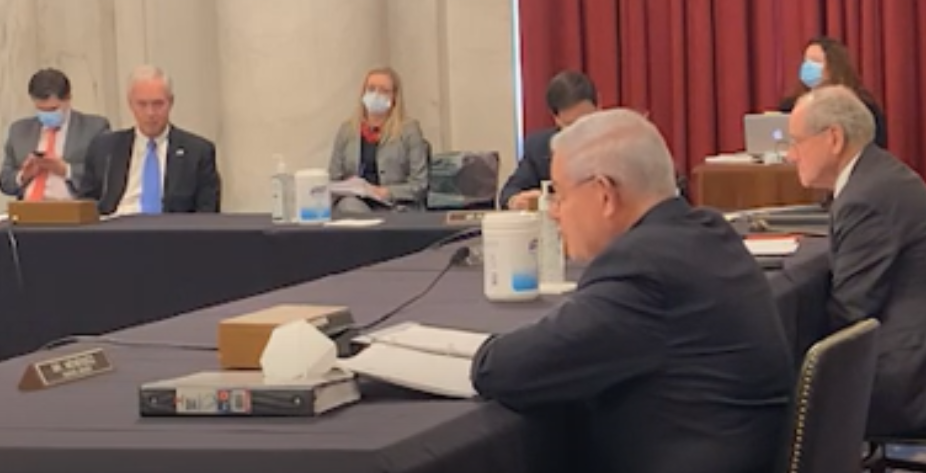Following Aftermath of Insurrection, Menendez Leads Colleagues in Demanding Greater Accountability and Transparency in Corporate Political Spending

Following Aftermath of Insurrection, Menendez Leads Colleagues in Demanding Greater Accountability and Transparency in Corporate Political Spending
WASHINGTON, D.C. – U.S. Senator Bob Menendez (D-N.J.), a senior member of the Senate Banking Committee and the new Chair of the Securities, Insurance, and Investment Subcommittee, today reintroduced the Shareholder Protection Act of 2021 to ensure public companies are more transparent and disclose their political spending activities to their shareholders. The January 6th violent attack against America’s sacred temple of democracy, the U.S. Capitol, demonstrates the urgency of getting big money out of politics, and this common-sense bill would start to do just that by requiring large corporations to receive authorization from a majority of its shareholders before managers can spend money on political activities. This bill has been cosponsored by Sens. Jeff Merkley (D-Ore.), Cory Booker (D-N.J.), Richard Blumenthal (D-Conn.), Maize Hirono (D-Hawaii), Patrick Leahy (D-Vt.), Elizabeth Warren (D-Mass.), Dick Durbin (D-Ill.), Chris Van Hollen (D-Md.), Kirsten Gillibrand (D-N.Y.), Amy Klobuchar (D-Minn.), Ed Markey (D-Mass.), Jeanne Shaheen (D-N.H.), Tammy Baldwin (D-Wis.), Sheldon Whitehouse (D-R.I.), and Dianne Feinstein (D-Calif.). The bill is also supported by Public Citizen, a consumer rights advocacy group and think tank.
Following the events of January 6th, 2021, corporate America’s response to the violent insurrection at the U.S. Capitol demonstrated precisely why corporate political spending is material information to shareholders, who deserve full visibility into the causes supported by the companies in which they choose to invest. Some public companies’ decision to suspend or reevaluate further political donations is an acknowledgment that political donations can significantly affect a company’s reputation and financial health. Without public disclosure of political contributions, shareholders are left in the dark about decisions that may affect a company’s bottom-line, and in the case of the January 6th insurrection, decisions to support organizations and campaigns that may have advocated stopping the certification of a free and fair election.
“Few companies today actually disclose their political spending to investors, let alone give them a say in this process,” said Sen. Menendez. “The events of January 6 taught us just how important this information is to investors and the public at large. Now is the time to reexamine how corporate executives spend shareholder money to influence election results and support causes with wide-ranging impacts to our country, including the health of our democracy. Corporations should not be allowed to use shareholder dollars as their piggy banks to support in secret whatever causes they may prefer. It’s long past time this information be made public and for shareholders to have a say.”
The Supreme Court’s 2010 Citizens United v. FEC decision opened the floodgates for corporate executives to spend unlimited money from company treasuries to disproportionately influence election outcomes, undermining the health of American democracy. While the Supreme Court has ruled that companies should be treated as people for purposes of free speech in electoral campaigns, the rights of the actual people investing in these large corporations—shareholders—have been largely overlooked. To date, more than 1.2 million securities experts, institutional and individual investors, and members of the public have pressed the U.S. Securities and Exchange Commission (SEC) for a political spending disclosure rule. Yet, no political spending disclosure standards have actually been established, which has allowed corporate executives to continue spending shareholder money without disclosure to and approval from the very investors funding those contributions.
“The Shareholder Protection Act of 2021 would help close this loophole in the disastrous Citizens United v. FEC decision, which has largely excluded shareholders from how large corporations decide to spend money from company treasuries for electoral or political purposes,” added Sen. Menendez. “For more than a decade, large corporations have been allowed to influence our elections and dilute the voting power of every day Americans in the electoral process. If a violent insurrection is not reason enough to address this glaring problem, then nothing will be. For the good of our democracy, we must act now.”
“Public Citizen has long supported the Shareholder Protection Act and applauds Senator Menendez and his Senate colleagues for holding corporate executives accountable for the money they spend in our politics and ensuring that shareholders – the true owners of corporations – are not kept in the dark,” said Rachel Curley, Democracy Advocate for Public Citizen. “Following the insurrectionist attack on the Capitol, many corporations paused their giving, proving that corporate political activity can present a risk to their brand. Now, it’s time to hold Corporate America accountable for its impact on our democracy.”
The Shareholder Protection Act:
· Requires shareholders to authorize, on an annual basis, a political activities budget requested by a company. The budget must receive a majority of votes representing all outstanding shares. Fiduciaries voting on behalf of their investors must disclose their vote to investors.
· Covers political spending activities affected by the Citizens United decision, including electioneering communications and independent expenditures. Dues and payments made to trade associations and other tax-exempt organizations are included if they could be used for such spending.
· Requires a company’s board of directors to vote to authorize each expenditure over $50,000 within the overall budget approved by shareholders.
· Requires public companies to disclose (online, to shareholders, and the SEC) individual board member votes and the details of each such approved expenditure.
· Requires the GAO to periodically report to Congress on implementation and compliance.








